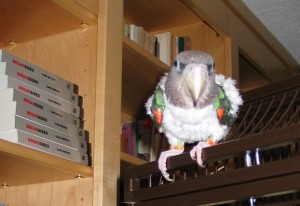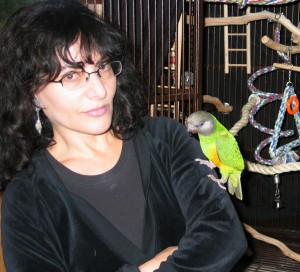BEAK
By Kit Wright
To the clicking of knitting needles, I fell asleep on the train
And I dreamed of knitting, is this what they call woolgathering,
Dreamed of my mother purling and plaining to patterns
In Woman’s Own Woman. I woke to a woman
Whose long mauve thumbnail was sharpened into a spike
And she texed, texed, texed with that pecking beak.
Update I (Jan. 18): Amazing. That readers of this blog would imagine I’d post a postmodern poem. The last bit of poetry I posted was that of the superlative Louis MacNeice. See “The Magic Of MacNeice.”
I skimmed “BEAK” in the Times Literary Supplement and liked it because it was so “plain” spoken and hit home hard in a few short sentences.
The guy dozes off on the train to the sounds of tapping, which triggers dreams of his mother’s pacifying knitting activity. He awakens to see beside him one of the millions of modern automatons texting feverishly with a beak-like implement. Haven’t you seen this specter all around you?
To me, “BEAK” is about a yen for a more comforting time in our collective past. It seems simple and un-intellectual (although not easy to write). It’s not written in post-modern parlance either. Any half-decent writer will admire “purling and plaining to patterns…” Neat.
My intention was not to perplex, but to please.
Update II (Jan. 19): The modern woman scares this man with her sharp edges. That’s another sensibility that jumped out at me.
And since BG brought up imagery, I was reminded of the wool shop situated in the central bus station of the Netanya of my youth. I had decided to master the art of knitting for a boyfriend of 4 years. (I wrote about the “the (unrequited) love of my life” in “About A Boy.”) Before being drafted, he was to get a pullover with intricate ropes down its considerable lengths, as he was “a powerfully built six-foot-three.”
It was a once-off affair: I mean the knitting, not the boy. The shop keeper provided all the instruction, patiently. The project was ongoing, and I’d pop in twice weekly on my way to school, for her to untangle knots and help when a new obstacle in the pattern presented itself. There was something so quaint and comforting about the deft wool lady and her knitting needles.
Does this poem evoke a sense of loss—perhaps becasue women no longer engage in homey activities we once associated with the comfort of mom, kindly shop lady, etc? When I read this little (never great, just neat) poem, I knew the poet was an older gentleman.
Homework: Check my instincts. Google his name to see if I am right.


